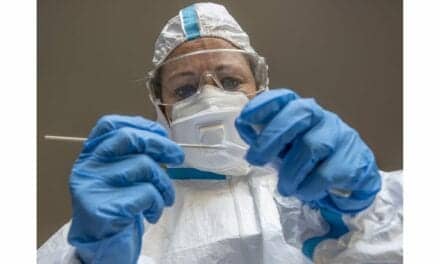Thermo Fisher Scientific is collaborating with the National Institutes of Health (NIH) Rapid Acceleration of Diagnostics (RADx) Initiative, Helix, and Rosalind to develop a new genotyping method for SARS-CoV-2 that could speed up the identification of variants as they emerge.
Utilizing a polymerase chain reaction (PCR)-based genotyping approach that can be implemented in any testing lab performing real-time PCR, this program allows for a significant scale up of SARS-CoV-2 surveillance efforts in the United States. Data generated from this program will be available to the public through the Rosalind Tracker website. This effort was funded by the National Institute of Biomedical Imaging and Bioengineering (NIBIB) as part of the NIH RADx Initiative to increase testing capacity and accessibility for the virus that causes COVID-19.
The rapid emergence of new SARS-CoV-2 variants raises several important public health questions, such as their ability to cause disease and their impact on vaccine efficacy. This makes it critical to track variants to better understand transmission patterns and possible consequences on health care resources. Next-Generation Sequencing (NGS) is the conventional method for detecting and tracing new variants, with about 5% of randomly selected SARS-CoV-2 positive samples in the United States being sent for variant identification. NGS, however, can possibly take up to 21 days from a positive result before variant data is available in public repositories.
“As COVID-19 evolves with new variants constantly emerging, surveillance will play a critical role as we learn to live with the virus,” says Manoj Gandhi, PhD, MD, senior medical director of genetic testing solutions, Thermo Fisher.
With the addition of genotyping, labs can classify a high percentage of positive samples and provide information within two to three days. They can also reduce costs for strain subtyping as compared to NGS. Samples that cannot be assigned to a known variant through the genotyping approach become prime candidates to detect new or emerging variants more rapidly.
“Our approach makes it possible to conduct surveillance testing on a significantly larger number of samples and quickly determine which variant is present in a sample,” says Eric Lai, PhD, co-lead investigator of the NIH RADx initiative. “If we start seeing a trend where we are unable to assign lineages using known markers in the genotyping assays, it is an early warning that a new variant may be emerging and helps determine which samples should be sent for sequencing. This is significant because emerging variants have the potential to evade vaccines, cause diagnostic test performance issues, or cause more severe disease.”
A recent paper outlines the performance of this method for identifying markers and assigning lineages to several SARS-CoV-2 variants, including previously characterized Variants of Concern (VOC) such as Alpha, Beta, Gamma and Delta. In addition, the study describes how this approach can be rapidly adapted to develop a targeted panel for currently circulating strains, such as Delta and Omicron, to allow for large-scale surveillance in routine testing laboratories.
The rapid selection and validation of highly sensitive and specific biomarkers for SARS-CoV-2 variants was enabled with the ROSALIND platform during the collaborative initiative. This dynamic, cloud-based data analytics platform was able to act as a centralized tool for labs by aggregating and analyzing the data in a real-time dashboard format. Thermo Fisher has updated the TaqMan SARS-CoV-2 Mutation Panel* to include the four markers that can detect the Omicron and Delta variants with high precision.
“Our challenge has been staying in front of this pandemic at the rate the virus is evolving. We’ve demonstrated an approach for maintaining highly accurate markers, rapidly implementing marker updates in manufacturing, and quickly deploying these assays to nationwide testing labs for validating COVID-19 positivity with lineage assignment,” says Tim Wesselman, CEO of Rosalind. “With a public tracking dashboard, this automated analysis, classification, and real-time genotyping reporting provides a snapshot of the most current strains circulating the country and provide us with valuable information to respond more quickly.”
*For research use only. Not for use in diagnostic procedures.





